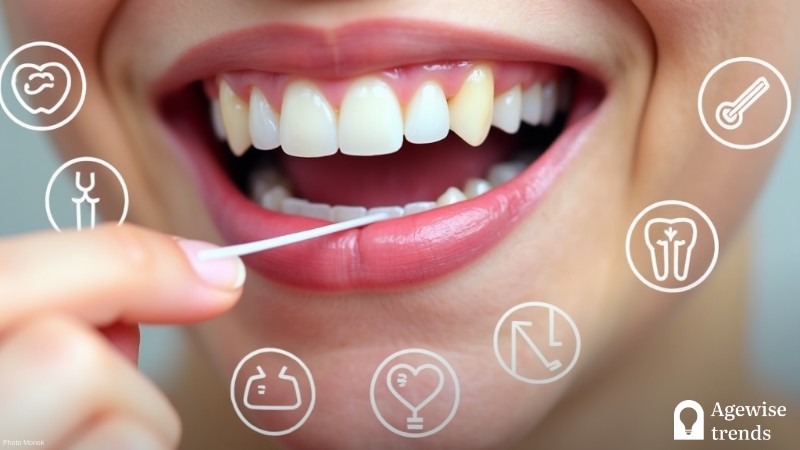When it comes to health, the role of teeth and gums is often overlooked, yet it remains essential at every stage of life, including the later years.
Teeth are more than just for appearance—they are vital to overall well-being. For older adults, maintaining good dental care is especially important, as poor oral health has been linked to various chronic conditions.
Dr. Shashwat Patel of Hamilton Dental in Hamilton, Ontario, explains that bacteria often enter through the mouth. In seniors with gum disease, these bacteria can spread through the bloodstream, potentially leading to complications in other areas of the body.
Key Takeaways
Maintaining proper dental care is crucial for older adults because it can prevent chronic diseases and cognitive decline.
- Poor oral health can cause systemic inflammation, increasing the risk of diabetes and other chronic conditions.
- Gum disease is linked to respiratory infections and cognitive decline, including Alzheimer’s disease.
- Regular dental checkups and proper oral hygiene practices are essential for seniors to maintain overall health.
Connection between dental and physical health
Like the rest of the body, the mouth harbors many germs, most of which are harmless. However, as the primary gateway to the digestive and respiratory systems, it can also serve as a pathway for harmful bacteria.
The digestive system breaks down food through a network of connected organs, while the respiratory system supports breathing. When harmful germs accumulate in the mouth, they can affect these systems and contribute to health problems.
Your mouth is the primary way bacteria enters your body. Bacteria can travel from areas like infected gums through the bloodstream to other parts of your body
Shashwat Patel
Under normal conditions, the body’s defenses and proper oral hygiene keep germs in check. Daily brushing and flossing help prevent bacteria from multiplying to levels that could lead to infections like tooth decay and gum disease.
That said, certain medications—including decongestants, antihistamines, pain relievers, diuretics, and antidepressants—can reduce saliva production. Since saliva helps wash away food particles and neutralize acids produced by bacteria, a decrease in saliva can create an environment where harmful germs flourish.
Bacteria in the mouth, along with inflammation, are linked to severe gum disease, known as periodontitis. Research suggests these factors may also contribute to other health conditions.
Additionally, diseases like diabetes and HIV/AIDS can weaken the body’s ability to fight infections, making oral health problems more severe.
The link between periodontal disease and diabetes
In August 2024, The American Journal of Medicine reported a strong correlation between periodontal disease and a higher likelihood of developing diabetes.
According to Dr. Frank A. Scannapieco, a researcher and professor of oral biology at the University at Buffalo School of Dental Medicine, chronic inflammation is thought to be a contributing factor.
“Long-term periodontitis can lead to systemic inflammation, which may contribute to diabetes. Over time, inflammation throughout the body can also play a role in insulin resistance,” he explained.
Insulin resistance is a key precursor to type 2 diabetes.
According to the study, advanced gum disease can elevate blood sugar levels, further increasing the risk of diabetes.
Oral health and other chronic diseases
Because the mouth is directly linked to the lungs, it can serve as a pathway for respiratory infections like pneumonia. Harmful bacteria may travel down the trachea, increasing the likelihood of lung infections, especially in patients who require intubation.
Oral health is also closely tied to brain function. Research suggests that poor oral hygiene may raise the risk of Alzheimer’s disease and other dementia-related conditions.
Chronic inflammation from gum disease can trigger neural inflammation, contributing to cognitive decline. Additionally, bacteria from the mouth can cross the blood-brain barrier, potentially increasing the likelihood of Alzheimer’s and dementia.
Maintaining proper oral hygiene is a straightforward yet crucial way to lower these health risks.
Tips for maintaining oral hygiene for seniors
With aging, oral health requires extra attention to prevent common issues such as gum disease, tooth decay, and dry mouth. Changes in saliva production, medication side effects, and underlying health conditions can all impact dental well-being.
Keeping the mouth clean and healthy plays a key role in overall health, making it essential to follow effective oral care practices such as the following.
1. Brush teeth at least twice daily for at least two minutes, once in the morning and once before bedtime.
2. Floss daily to remove plaque and prevent gum disease.
3. Schedule regular dental check-ups every six months for professional cleaning and early cavity detection.
4. Eat a balanced diet and limit sugary foods and drinks to protect oral health.
5. Consider dental implants or dentures to prevent further tooth loss and support proper nutrition.
6. Replace toothbrushes every three to four months, or sooner if the bristles become worn or frayed.
Conclusion
Proper dental care plays a crucial role in enhancing the quality of life for seniors by reducing the risk of chronic illnesses and cognitive decline.
We’ve seen some interesting clues that oral bacteria could influence the course of a disease like Alzheimer’s
Dr. Frank Scannapieco
The benefits of proper oral care extend beyond a healthy smile—they are directly tied to overall well-being. Research highlights the undeniable connection between oral hygiene and physical health, reinforcing the importance of consistent dental care.
Regular dental check-ups and a dedicated oral care routine help prevent a range of health complications. Since these preventive measures are simple to follow, they can be easily incorporated into daily routines, promoting long-term wellness.
For seniors, prioritizing good oral hygiene is key to a healthier, more fulfilling life.















